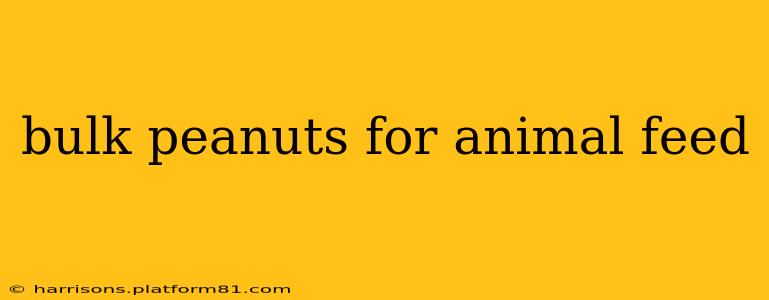Peanuts are a surprisingly versatile and nutritious feed for a variety of animals, offering a rich source of protein, healthy fats, and essential nutrients. However, sourcing bulk peanuts specifically for animal feed requires careful consideration of quality, cost, and the specific dietary needs of your animals. This guide will delve into the specifics of using peanuts for animal feed, addressing common questions and providing valuable insights for farmers and animal owners.
What types of animals benefit from peanut feed?
Many animals can thrive on a diet supplemented with peanuts, particularly those requiring high protein and energy levels. Common beneficiaries include pigs, poultry (chickens, turkeys), cattle, and even some pet species like horses (in moderation). The nutritional benefits of peanuts can contribute to improved growth rates, increased egg production (in poultry), and enhanced overall animal health. However, it's crucial to remember that peanuts should be a supplement, not the sole component of an animal's diet. A balanced and diverse feed plan is always recommended.
Where can I buy bulk peanuts for animal feed?
Locating bulk peanuts often involves exploring several avenues. Agricultural supply stores, feed mills, and even some larger farming co-ops frequently carry bulk peanuts designated for animal feed. Online marketplaces specializing in agricultural products can also be a viable option, offering access to a wider range of suppliers and potentially competitive pricing. When purchasing, ensure you're acquiring peanuts specifically intended for animal consumption, as those meant for human consumption may undergo different processing methods.
Are there different grades of peanuts for animal feed?
Yes, just like peanuts intended for human consumption, peanuts destined for animal feed come in varying grades. These grades reflect the quality of the peanuts, with factors like size, cleanliness, and the presence of aflatoxins (a harmful toxin) influencing the classification. Lower-grade peanuts, often those with minor blemishes or imperfections, are typically more affordable and are perfectly suitable for animal feed. Always check with the supplier to understand the grade of peanuts you're purchasing and ensure it's safe for your animals.
What are the nutritional benefits of peanuts for animals?
Peanuts are rich in protein, making them a valuable component of a balanced animal diet, especially for growing animals or those requiring high-protein rations. They also offer a good source of healthy fats, which contribute to energy levels and overall health. Furthermore, peanuts provide essential vitamins and minerals, albeit in varying quantities depending on the grade and processing methods. However, remember that peanuts alone cannot provide all the necessary nutrients; a well-rounded diet is essential.
How should I store bulk peanuts for animal feed?
Proper storage is crucial to prevent spoilage and maintain the nutritional quality of your bulk peanuts. A cool, dry, and well-ventilated area is ideal. Keep the peanuts in airtight containers or bags to prevent moisture absorption and insect infestation. Regularly check for signs of mold, spoilage, or infestation, discarding any affected peanuts immediately. Poor storage can lead to the development of aflatoxins, which are toxic to animals, highlighting the importance of diligent storage practices.
Are there any potential risks associated with feeding peanuts to animals?
While peanuts offer numerous benefits, potential risks exist. Aflatoxin contamination is a significant concern. Aflatoxins are potent toxins produced by certain molds that can grow on peanuts if not stored properly. Ingesting aflatoxins can lead to liver damage and other health problems in animals. Furthermore, some animals might be allergic to peanuts, so introducing peanuts to an animal's diet should be done gradually and cautiously, observing for any adverse reactions.
Can I use leftover peanuts from human consumption for animal feed?
While seemingly a cost-effective approach, using leftover peanuts from human consumption for animal feed requires caution. Salted peanuts, for instance, are unsuitable due to the high sodium content, which can be harmful to many animals. Peanuts with added sugars, flavors, or other additives are also not recommended. Always prioritize peanuts specifically intended for animal feed to ensure safety and nutritional adequacy.
This comprehensive guide provides a solid foundation for understanding the use of bulk peanuts in animal feed. Remember always to consult with a veterinarian or animal nutritionist to determine the appropriate amount and suitability of peanuts within your animals' overall diet plan. Prioritizing safe sourcing, proper storage, and mindful feeding practices ensures the beneficial use of peanuts in promoting animal health and well-being.
